|
|
|
Sort Order |
|
|
|
Items / Page
|
|
|
|
|
|
|
| Srl | Item |
| 1 |
ID:
138430
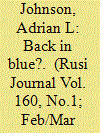

|
|
|
|
|
| Summary/Abstract |
Since the end of the Cold War, the UK has generally made only modest military troop contributions to UN peacekeeping operations. As it prepares to review its defence and security strategy after the end of its long commitment to combat operations in Afghanistan, however, troop requirements for UN peacekeeping activities may appear again on the radars of policy-makers. Adrian L Johnson argues that there are broadly four options that the UK could take, the most likely being modest re-engagement with the military dimension of UN peacekeeping.
|
|
|
|
|
|
|
|
|
|
|
|
|
|
|
|
| 2 |
ID:
153546
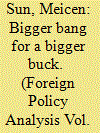

|
|
|
|
|
| Summary/Abstract |
While China used to condemn UN peacekeeping as a Western tool in the 1970s, it now supplies the largest number of UN peacekeeping troops among the UN Security Council Permanent Five. To explain this puzzling change in China’s attitude toward UN peacekeeping, this paper constructs an original framework that unpacks China’s evolution in self-identity as a “responsible major power” by first disaggregating the economic, military, and political costs and benefits for its participation in UN peacekeeping. In so doing, this paper shows that China’s attitudinal change is best captured by a shift from a present-cost-driven, “purchase” model of participation in international institutions to a future-benefit-driven, “investment” model of participation. A series of key events that occurred between the mid-1990s and the early 2000s, notably China’s accession to the WTO and its successful bid to host the 2008 Olympic Games, had in part accustomed China to paying large institutional costs upfront in order to be “part of the club.” The paper concludes with a brief discussion on the applicability, or the lack thereof, of the Chinese experience to other countries’ experiences with international institutions given China’s unique historical trajectory and cultural idiosyncrasies.
|
|
|
|
|
|
|
|
|
|
|
|
|
|
|
|
| 3 |
ID:
179361
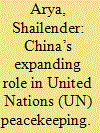

|
|
|
|
|
| Summary/Abstract |
For much of the Cold War period, China was highly sceptical of the concept of United Nations (UN) peacekeeping, viewing it as a thinly veiled disguise for imperialist interventions by the great powers. Further, Deng Xiaoping’s 24 character strategy which stressed on keeping a low profile had guided China’s foreign policy for over two decades. All this has changed under Xi Jinping, wherein UN peacekeeping was identified as a relatively low-risk vehicle to gain global prominence. Consequently, from total opposition to the role of UN itself, China has now transformed as a champion of UN peacekeeping. Today, China provides the 10th largest troop contribution and Beijing is the UN peacekeeping programme’s second largest funder, providing 15 percent of the program’s overall budget. In fact, China provides more personnel to peacekeeping operations than any other permanent member of the Security Council, and has almost twice as many as the other four permanent members combined. This has provided China with global acceptability, significant clout in Africa, and helps to foster China’s image as the leader of the developing world. However, the Chinese intensions are anything but benign. A ‘Wolf Warrior’ diplomacy is on the increase, the Chinese peacekeeping efforts are intertwined with Chinese economic interests, and the overall aim seems to expand Chinese influence across the world.
|
|
|
|
|
|
|
|
|
|
|
|
|
|
|
|
| 4 |
ID:
120225
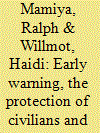

|
|
|
|
|
| Publication |
2013.
|
| Summary/Abstract |
This commentary traces the increasing importance of early warning in United Nations (UN) peacekeeping, an emphasis that has emerged in connection with the evolution of protection of civilians mandates in UN peacekeeping missions. It examines the current and emerging practice of early warning in UN peacekeeping as well as the challenges faced, drawing on case studies from the UN missions in South Sudan and the Democratic Republic of the Congo. The authors also propose a set of basic principles upon which early warning in UN peacekeeping operations might be approached in the future.
|
|
|
|
|
|
|
|
|
|
|
|
|
|
|
|
| 5 |
ID:
148556
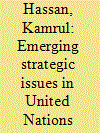

|
|
|
|
|
| Summary/Abstract |
United Nations (UN) peacekeeping activities have seen an exponential growth in both size and scope since their inception in mid-1950s. These operations are now seen as the core activity of the international community’s effort to establish peace in conflict-torn countries around the world. Operational environment and nature of threats in the UN Peacekeeping Operations (PKOs) area are continuously changing. UN also had to evolve and adopt new strategies to cope up with the operational environment. Changes in the operational strategy of UN are a continuous process. Troops Contributing Countries (TCCs) need to remain fully abreast with the strategies of UN to prepare their armed forces accordingly. The landmark Brahimi Report has manifested a renewed vision for UNPKOs to make them more effective and comparatively cost-efficient. It includes several important recommendations for enhancing capacity and effectiveness of UNPKOs. UN has already implemented some reforms according to the recommendations of the report in various areas of PKOs such as peacekeeping policy and strategy, structure of peacekeeping department, conduct and discipline etc. The reform agendas and other evolving strategic issues demand in-depth analysis by TCCs. This paper highlights important evolving strategies of UNPKOs along with an analysis to reveal their implications to the Bangladesh Armed Forces. Apparently, it is felt that Bangladesh Armed Forces may struggle to continue its current share in troops contribution if appropriate measures are not taken to face foreseeable challenges. The paper also recommends few measures which may help Bangladesh Armed Forces take benefits of the opportunities and minimise effects of the perceived challenges resulting from the evolving strategies.
|
|
|
|
|
|
|
|
|
|
|
|
|
|
|
|
| 6 |
ID:
149275
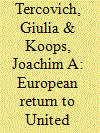

|
|
|
|
|
| Summary/Abstract |
This introductory article outlines the main rationale of the Special Issue and places the topic of the so-called ‘European Return to United Nations Peacekeeping’ in the wider context of recent policy developments and conceptual discussions related to the literature on UN troop contributions. It then outlines some of the key findings of the nine case studies (Denmark, France, Germany, Ireland, Italy, Norway, Sweden, the Netherlands and the United Kingdom) included in this issue. The article concludes that despite a recent engagement of a group of European countries in the Multidimensional Integrated Stabilization Mission in Mali (MINUSMA), expectations of a large-scale ‘return of Europe’ to UN peacekeeping are premature. While the MINUSMA experience will certainly spark important discussions and developments related to the future of UN peacekeeping and Western contributions, European countries will continue to commit only selectively troops on a case-by-case basis and only if a wide range of facilitating factors align as much as they did in the Mali case.
|
|
|
|
|
|
|
|
|
|
|
|
|
|
|
|
| 7 |
ID:
137345
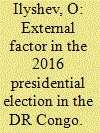

|
|
|
|
|
| Summary/Abstract |
APRIL 2014 marked twenty years since the beginning of the genocide of the Tutsi of Rwanda; organized by the Hutu and practically ignored by the key international actors and the UN it went on for three months to shape the future of Rwanda* and echoed across the vast Great Lakes region, first and foremost in the Republic of Zaire (the Democratic Republic of the Congo, DRC, since May 1997). Hundreds of thousands of refugees, both Tutsi and Hutu,** created a big seat of tension in the country's east; in 1997, the Mobutu regime fell victim to this tension fanned by inner ethnic and political contradictions which in 1996 had developed into an armed conflict still going on in the east of the DR Congo.
|
|
|
|
|
|
|
|
|
|
|
|
|
|
|
|
| 8 |
ID:
149278
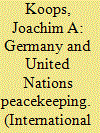

|
|
|
|
|
| Summary/Abstract |
This article examines Germany’s past, present and future approach to UN peacekeeping, particularly in the context of a potential ‘European return to UN Peacekeeping’ and the country’s recent commitment to contribute to the Multidimensional Stabilization Mission in Mali (MINUSMA). By applying a conceptual framework for assessing facilitating and inhibiting factors related to Germany’s past and current participation in UN peacekeeping operation, the article argues that core reasons for German troop contributions range from bilateral partnerships and multilateral pressures, to the role of individual policy entrepreneurs and inter-organizational aspects. Yet, Germany’s culture of restraint and public scepticism towards military operations act as important inhibiting factors. Most crucially, Germany has since the early 1990s pursued an instrumentalist approach to UN peacekeeping in order to strengthen its international profile within a discourse of ‘assuming more responsibility’, to advance ‘normalization’ in security affairs and to enhance internal political and external bilateral security cooperation schemes. Germany’s recent commitment to MINUSMA and its discourse will not result in a ‘big bang’ return to UN peacekeeping, but rather to selective commitments on a carefully assessed case-by-case basis.
|
|
|
|
|
|
|
|
|
|
|
|
|
|
|
|
| 9 |
ID:
155642
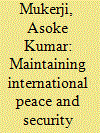

|
|
|
| 10 |
ID:
089829
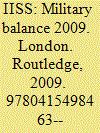

|
|
|
|
|
| Publication |
London, Routledge, 2009.
|
| Description |
488p.pbk
|
| Standard Number |
9780415498463
|
|
|
|
|
|
|
|
|
|
|
|
Copies: C:1/I:0,R:1,Q:0
Circulation
| Accession# | Call# | Current Location | Status | Policy | Location |
| 054342 | 355.03/IIS 054342 | Main | On Shelf | Reference books | |
|
|
|
|
| 11 |
ID:
115273
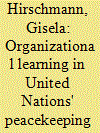

|
|
|
|
|
| Publication |
2012.
|
| Summary/Abstract |
This article illustrates how organizational learning can explain the shift in United Nations' peacekeeping exit strategies from the election-based approach of the 1990s to peacebuilding. Conceptualizing learning as an ideal-type, three-step process, of knowledge acquisition, interpretation and institutionalization, the analysis reveals the impact of new knowledge on institutional change. It demonstrates how knowledge acquisition became systematized within the United Nations' Secretariat especially after 2000, with the active promotion of boundary-spanning activities. The analysis then shows how a shared understanding of the role of peacebuilding for exit strategies was developed by the organization's bureaucracy and intergovernmental bodies in the interpretation step. Finally, it highlights how the establishment of the Peacebuilding Commission institutionalized the transition to peacebuilding as the new exit strategy and how new learning capacities were created. By conceiving the interaction between international organizations and their external environment as a dynamic relationship, the analysis confirms the potential of organizational learning theories for explaining institutional change in international relations.
|
|
|
|
|
|
|
|
|
|
|
|
|
|
|
|
| 12 |
ID:
137578
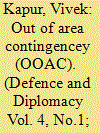

|
|
|
| 13 |
ID:
053953
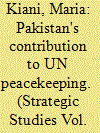

|
|
|
| 14 |
ID:
071111
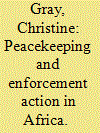

|
|
|
| 15 |
ID:
069897
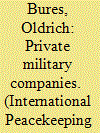

|
|
|
|
|
| Publication |
2005.
|
| Summary/Abstract |
This article analyses the perils and benefits of outsourcing UN peacekeeping to private military companies (PMCs). Various PMCs have a proven capacity to perform at least some peacekeeping functions. Although experts have expressed serious doubts whether their capacity to do peacekeeping will always translate into the achievement of peace and security, the author contends that PMC peacekeeping should not be dismissed on ideological or moral grounds when the choice is either a PMC operation or none at all. It is, however, imperative that the perils of using PMCs are addressed before peacekeeping is turned over to the private market. In particular, a set of clear mechanisms of accountability, control and transparency of the PMCs needs to be put in place.
|
|
|
|
|
|
|
|
|
|
|
|
|
|
|
|
| 16 |
ID:
131286
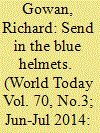

|
|
|
| 17 |
ID:
146281
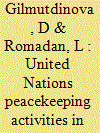

|
|
|
|
|
| Summary/Abstract |
THE UNITED NATIONS peacekeeping operations are a key means of settlement of armed conflicts and post-conflict political normalization. Due to the escalation of some conflicts, they are more important in the 21st century than ever before.
|
|
|
|
|
|
|
|
|
|
|
|
|
|
|
|
| 18 |
ID:
136067
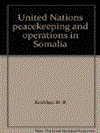

|
|
|
|
|
| Publication |
Gurgaon, Dipika Kochhar, 2000.
|
| Description |
iv, 305p.Hbk
|
| Standard Number |
8175251727
|
|
|
|
|
|
|
|
|
|
|
|
Copies: C:1/I:0,R:0,Q:0
Circulation
| Accession# | Call# | Current Location | Status | Policy | Location |
| 058084 | 341.584096773/KOC 058084 | Main | On Shelf | General | |
|
|
|
|
|
|
|
|
|